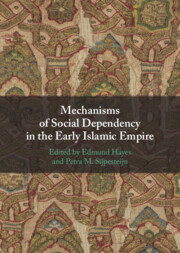Book contents
- Frontmatter
- Contents
- List of Illustrations
- List of Tables
- List of Contributors
- Notes on Transliteration, Place Names, Dates, Editions, and Translations
- Acknowledgments
- Introduction: The Ties that Bound the Societies of the Islamic Empire
- Part I Personal ties
- 1 Ties of Unfreedom in Late Antiquity and Early Islam: Debt, Dependency and the Origins of Islamic Law
- 2 The Local Clergy and “Ties of Indebtedness” in Abbasid Egypt: Some Reflections on Studying Credit and Debt in Early Islamicate Societies
- 3 ‘Return to God and the Brotherhood of Good and Excellent People’: Bringing the Prodigal Son Back Home in Ayyubid Egypt
- 4 Aloneness as Connector in Arabic Papyrus Letters of Request
- 5 Swearing Abū al-Jaysh into Office: The Loyalties of Ṭūlūnid Egypt
- Part II Institutions
- Part III Communities
- Index
4 - Aloneness as Connector in Arabic Papyrus Letters of Request
from Part I - Personal ties
Published online by Cambridge University Press: 06 December 2024
- Frontmatter
- Contents
- List of Illustrations
- List of Tables
- List of Contributors
- Notes on Transliteration, Place Names, Dates, Editions, and Translations
- Acknowledgments
- Introduction: The Ties that Bound the Societies of the Islamic Empire
- Part I Personal ties
- 1 Ties of Unfreedom in Late Antiquity and Early Islam: Debt, Dependency and the Origins of Islamic Law
- 2 The Local Clergy and “Ties of Indebtedness” in Abbasid Egypt: Some Reflections on Studying Credit and Debt in Early Islamicate Societies
- 3 ‘Return to God and the Brotherhood of Good and Excellent People’: Bringing the Prodigal Son Back Home in Ayyubid Egypt
- 4 Aloneness as Connector in Arabic Papyrus Letters of Request
- 5 Swearing Abū al-Jaysh into Office: The Loyalties of Ṭūlūnid Egypt
- Part II Institutions
- Part III Communities
- Index
Summary
Amongst the thousands of papyrus and paper documents from medieval Egypt written in Greek, Coptic and Arabic there are a large number of letters of requests and petition letters. This chapter examines how the senders of these letters used the argument of being alone and helpless to persuade the letter’s recipient to undertake some action to help the petitioners. By presenting the petitioner as someone without friends, family or anyone else to help them, a relationship is created with the petitioned who can help based on the social and moral expectations that prevailed in early Islamic Egyptian society.
- Type
- Chapter
- Information
- Mechanisms of Social Dependency in the Early Islamic Empire , pp. 127 - 149Publisher: Cambridge University PressPrint publication year: 2024
- Creative Commons
- This content is Open Access and distributed under the terms of the Creative Commons Attribution licence CC-BY-NC-ND 4.0 https://creativecommons.org/cclicenses/

